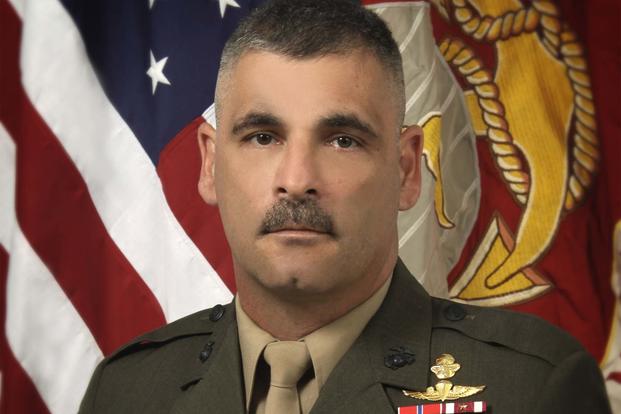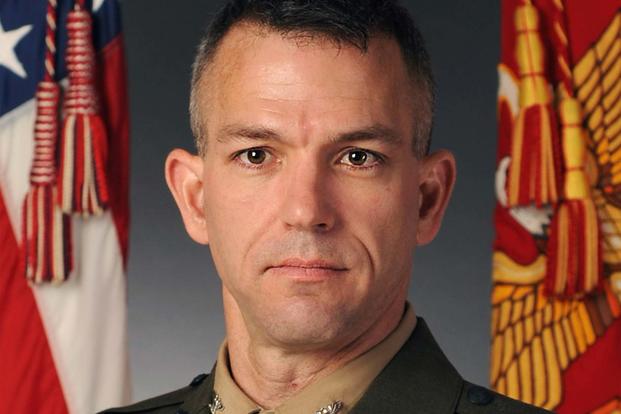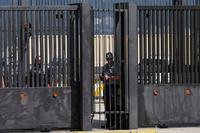Editor's Note: The Department of the Navy’s Board for the Correction of Naval Records ultimately determined that Col. Morgan Mann was unjustly removed from command by Lt. Gen. Rex McMillian. On Feb. 22, 2021, the BCNR directed the Commandant of the Marine Corps to remove all adverse material from his official record.
Three Marine leaders who were fired from their Reserve command last year failed to address low morale and a poor command climate, caused in part by the mistreatment of at least one unit member who was dealing with a medical issue, according to an investigation obtained by Military.com.
Col. Morgan Mann, Sgt. Maj. James Boutin and Chief Warrant Officer 3 Robert Hoy were relieved of their duties in October 2017 by Lt. Gen. Rex McMillian, then-commander of Marine Forces Reserve. Mann was the 25th Marine Regiment's commanding officer, Boutin served as inspector-instructor, and Hoy was a personnel officer.
Mann has remained in the Marine Corps Reserve and is now assigned to the Inactive Ready Reserve, Maj. Roger Hollenbeck, a spokesman for MARFORRES, told Military.com. Hoy is also still in MARFORRES and currently assigned to Reserve Base Support, he said. Boutin retired from the Marines on June 1.
McMillian lost confidence and trust in the Marines' ability to command and lead members of regiment, which is based out of Fort Devens, Massachusetts, according to documents obtained via a Freedom of Information Act request.
The investigation was launched after a complaint was filed about the unit. When the investigator was conducting interviews, several Marines said they did not want to include criticisms of their command in written statements, citing concerns about career fallout or creating more tension in the workplace.
"I found this to be indicative of an underlying fear of retribution from leadership," the investigating officer wrote.
Command leadership were also found to have mishandled a Marine's medical case with "reckless indifference," after the person was ordered to return to duty against doctor's orders. The investigating officer found that the mishandling of that incident was brought about by a host of factors, including a lack of basic leadership, a lack of moral courage, poor communication and an extremely high operational tempo.
Despite two command-climate surveys and a preliminary inquiry into a hostile work environment that "documented a significant volume of problems," according to the investigation, Marines in the unit felt that no improvements were being made.
"I received multiple comments to the effect that 'all these surveys and all these investigations don't make a difference anyway,' " the investigating officer wrote.
Members of 25th Marines complained of too much work that was unevenly distributed inside the Reserve command, according to the report. Senior staff noncommissioned officers were not present and didn't contribute to the success of the unit, it said. There was poor communication, little concern for Marines' well-being, and a drive to accomplish the mission that came with the threat of formal counseling or adverse fitness reports, the investigation states.
"Several Marines spoke of sleeping at the unit and working through many weekends due to operational requirements, funerals, community-relations events and drill weekends," the investigator wrote. "... Additionally, recommendations for improvements were dismissed by leadership."
'A Pattern of Negative Leadership'
When a November 2016 command-climate survey of about three dozen full-time active and active-Reserve Marines showed a significant trend of low morale and dissatisfaction, leaders held a town hall meeting to address the results.
"However, there is no record of a formal corrective action plan," according to the report.
About six months later, a second command-climate survey found the trend applied to a wider pool of Marines within the regiment when about 125 respondents also reported low morale and dissatisfaction.
In both surveys, according to the investigation, Marines reported extremely long duty hours, too much work to be accomplished with on-hand personnel, a disregard for staff members' recommendations, and a lack of time for military occupational specialty training.
"Several statements from Marines indicated widespread low morale and a pattern of negative leadership and intimidation," the investigating officer wrote.
Several key billets were gapped when some 23 members of the regiment participated in a deployment to Central America with Special Purpose Marine Air-Ground Task Force-Southern Command from March through November 2017.
One leader, whose name was redacted in the report, said they were aware of the morale problems in the unit and were "systematically addressing the issues."
That included improving training during drill weekends; conducting fresh command-climate surveys; directing reinstatement of a unit professional military education program that allowed the staff to build camaraderie while exploring local history; and responding quickly to allegations of a hostile work environment by directing a preliminary inquiry into the claims.
Some of these measures have been effective, according to Hollenbeck.
"There are indicators of improved command climate within the Regimental Headquarters, as reflected in a recent (Oct 2018) Organizational Climate Survey," he said in a statement. "One focus area of the survey is equal opportunity/fair treatment; it specifically addresses inclusion, discrimination, sexual harassment, and sexual harassment retaliation. In each of these categories, the unit scored above both the service and the unit type (infantry) average."
Hollenbeck added that the unit continues to run at a high operational tempo.
"But the ability of the unit to manage all requirements has improved by an infusion of new and additional personnel, as well as a leadership focus on maintaining a positive command climate and enabling the balance of work and non-work (family) requirements," he said.
The investigation also found that a lack of formalized procedures led to confusion on roles and responsibilities between the battalion's headquarters company and regimental staff. That led to confusion about who should've been notified about a Marine's medical condition, which the investigating officer found had been mishandled.
In that case, two staff NCOs were told to make a health and welfare visit to a Marine's residence to instruct them that the command was directing them to return to duty. On the way there, "both SNCOs expressed misgivings to each other about the appropriateness of this directive," the investigation states, "but continued with their mission with a stated assumption that the 'colonel' gave this order."
If the Marine didn't return to duty, at least one of the staff NCOs told them, they'd be charged with "unauthorized absence," despite that going against doctor's orders.
The investigating officer found that members of the command handled the situation with "callous disregard for the Marine's health and well-being." The two staff NCOs also "displayed a lack of leadership and moral courage by executing the duty-status notification order that they both judged as wrong," the report states.
As a result, the officer recommended that the personnel with 25th Marines receive additional training about dealing with Marines' medical situations. The investigating officer also recommended that the regiment publish guidance to clear up confusion on duties, authorities and chains of command, along with a policy letter on basic leadership principles, emphasizing morale and welfare of their Marines.
Hollenbeck said the unit had received a new senior enlisted Navy medical professional over the last year to provide guidance on the handling of medical issues.
"Orders stipulate that a service member's commanding officer bears overall and final responsibility for the well-being of each member of the unit; it is the responsibility of unit Navy medical professionals to ensure that appropriate information is conveyed to the commanding officer to ensure he/she effectively carries out their responsibilities in all medical matters," Hollenbeck said.
As a result of problems and concerns identified in the October 2017 climate survey, he said, the command team led several unit-wide discussions to improve unit functions and cohesion.
"Additionally, the command took a number of steps to improve information sharing, and to better designate roles and responsibilities, including the publication of letters of instruction for each month's drill period that detailed commander's intent, the concept of operations, and specific roles and responsibilities," he said.
The current commander of 25th Marines, Col. Justin Dunne, published a letter on leadership that reinforces Marine Corps leadership traits and principles, Hollenbeck said, in keeping with the investigation's recommendations.
"Additionally, the command has made a concerted effort over the course of the last 12 months to emphasize fair and equal treatment, to bolster unit cohesion, and to establish a positive command climate," he said.
-- Gina Harkins can be reached at gina.harkins@military.com. Follow her on Twitter at @ginaaharkins.













